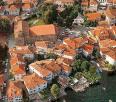
That anyone is the world would care about listening to anything I have to say always shocks me. I am, above all, a very humble person who stumbled into the profession of computers at the perfect moment in time back in the very early 80’s. The DNA inside me lined up correctly to make me compatible with computer technology. Perhaps it is an extension of the inventiveness of my Grandfather that was transferred into me. All I know is that I understand computers and more importantly, I understand how to apply technology to make certain everyday things happen more efficiently. Computers help me make order from chaos.
So here I am sitting in a room overlooking the one tourist attraction in Macedonia – Lake Ohrid. This room sits on the top of an otherwise lackluster hotel but is situated in such a way that all you do see is the Lake outside the windows and the mountains on the other side of the lake which is Albania. The tremendous rain from last night has left us with a spectacular day. The cumulus clouds look like cotton candy floating in the air. The sun is brightly shining and the water is differently illuminated by the sun coming through the gaps between the clouds.
Off to the right side of the lake I can see a Castle. An honest to God Castle built in the 3rd century BC around which the old city of Ohrid is situated. The Castle is in perfect condition and it provides stark testimony to the fact that they built things to last back then. Below the Castle is an Orthodox Church which was built prior to 1058. In the States if something was built in the late 1600’s we make it a national treasure – In Macedonia something built in the 1600’s is considered recent architecture.
All of the sudden I am introduced and I need to stop looking out the Window.
…”Mr. Strachan will now speak to us about his project called Macedonia Connects…”
I am on! This is probably the 40th presentation I have made about Macedonia Connects in the past 12 months. I have grown more comfortable with each presentation but I start them all out the same way…
“I want to thank you all for taking time to hear this presentation. I am always amased that people are here to listen to what I have to say”
I make this statement as much to set myself at ease as to have a good opening line.
“Today I want to tell you about a GREAT project called Macedonia Connects which is responsible for making Macedonia the first all wireless country in the World”
And so I progress through slide after slide of my powerpoint presentation hoping to hit the most important points each time.
“…What Macedonia Connects represents is a successful public private partnership…”
I get to the slide which shows the ice covered mountains of Macedonia and people usually laugh when they see the title of the slide – “Technical Challanges”
“…While this project started as a connectivity for schools activity it grew into a national connectivity solution…”
I am on auto pilot but I am not hitting all of the points I need to make. I sense that I am rushing through it. I pause and I look out the window and see a boat going past and wish I was on the boat.
“Macedonia Connects has received tremendous publicity including the Wall Street Journal, NY Times, Business Week…”
I am almost done at this point. 30 minutes already and it felt like 5. My shirt is getting wet as I perspire during my presentation. Don’t let the audience see you sweat!!
“I will close by saying that my work in Macedonia has been an amasing experience for me and it has been a great project. I believe that our results can be replicated in other countries and I look forward to working on future projects like Macedonia Connects…are there any questions?”
WHEW…it is over, people rarely ever ask questions and when they do they are softball questions.
“…can you please tell us what elements need to be in place in a country before a Macedonia Connects type project can be executed?”
WOW, now that’s a good question. I have an answer. The answer creates more questions. We actually have an exchange of ideas going on here. Time is quickly passing. Question after question and I hit them out of the ballpark, at least I think I do…”
“If there are no other questions for Mr. Strachan I would now like to thank him for his very informative and enlightening presentation. It certainly shows that activities like this are needed throughout the Balkans region”
I heard applause and we go to a break. I just want to head to the bathroom and people come up to me asking for my presentation to be placed on their thumb drive. Some people hand me their business card while others want to ask me questions. I felt like someone with an important message that people wanted to hear.
Within 5 minutes my eyes were on the lake and the beautiful day. My performance was over. I was a little more confident in myself.
Perhaps next time I will simply start the presentation with “Today I want to tell you about a GREAT project called Macedonia Connects which is responsible for making Macedonia the first all wireless country in the World”
